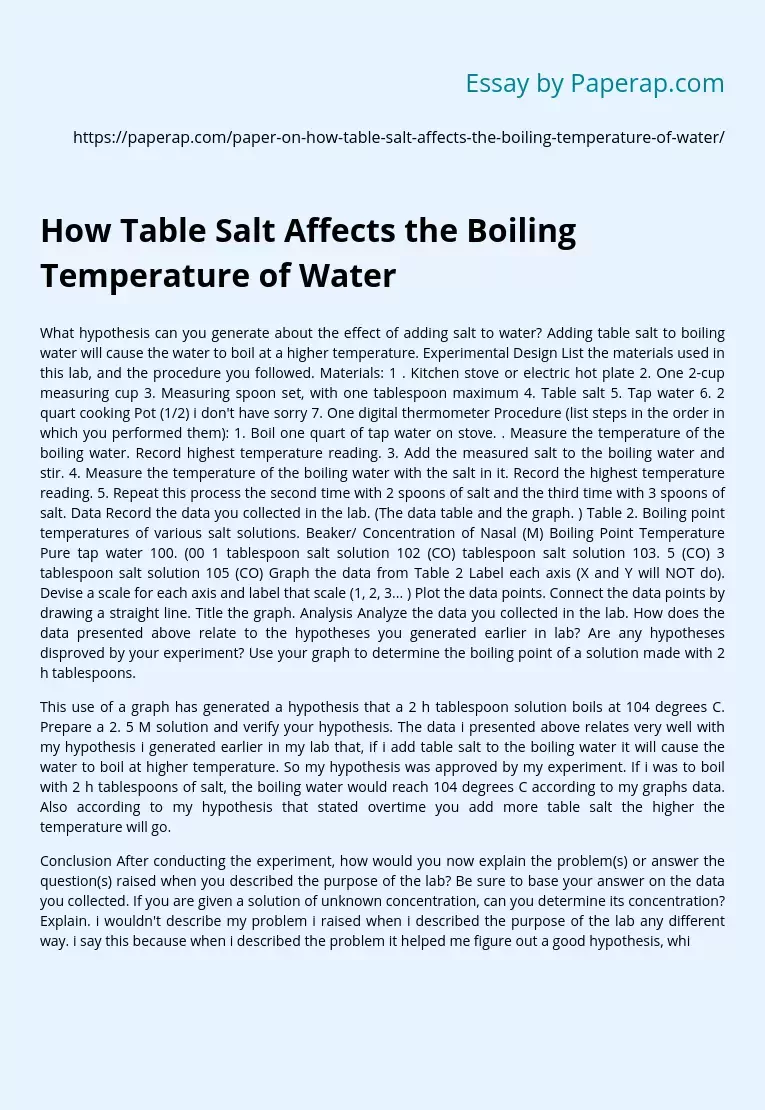How Table Salt Affects the Boiling Temperature of Water
What hypothesis can you generate about the effect of adding salt to water? Adding table salt to boiling water will cause the water to boil at a higher temperature. Experimental Design List the materials used in this lab, and the procedure you followed. Materials: 1 . Kitchen stove or electric hot plate 2. One 2-cup measuring cup 3. Measuring spoon set, with one tablespoon maximum 4. Table salt 5. Tap water 6. 2 quart cooking Pot (1/2) i don’t have sorry 7. One digital thermometer Procedure (list steps in the order in which you performed them): 1.
Boil one quart of tap water on stove. . Measure the temperature of the boiling water. Record highest temperature reading. 3. Add the measured salt to the boiling water and stir. 4. Measure the temperature of the boiling water with the salt in it. Record the highest temperature reading. 5. Repeat this process the second time with 2 spoons of salt and the third time with 3 spoons of salt. Data Record the data you collected in the lab. (The data table and the graph.
) Table 2. Boiling point temperatures of various salt solutions. Beaker/ Concentration of Nasal (M) Boiling Point Temperature Pure tap water 100. (00 1 tablespoon salt solution 102 (CO) tablespoon salt solution 103. 5 (CO) 3 tablespoon salt solution 105 (CO) Graph the data from Table 2 Label each axis (X and Y will NOT do). Devise a scale for each axis and label that scale (1, 2, 3… ) Plot the data points. Connect the data points by drawing a straight line. Title the graph. Analysis Analyze the data you collected in the lab. How does the data presented above relate to the hypotheses you generated earlier in lab? Are any hypotheses disproved by your experiment? Use your graph to determine the boiling point of a solution made with 2 h tablespoons.
This use of a graph has generated a hypothesis that a 2 h tablespoon solution boils at 104 degrees C. Prepare a 2. 5 M solution and verify your hypothesis. The data i presented above relates very well with my hypothesis i generated earlier in my lab that, if i add table salt to the boiling water it will cause the water to boil at higher temperature. So my hypothesis was approved by my experiment. If i was to boil with 2 h tablespoons of salt, the boiling water would reach 104 degrees C according to my graphs data. Also according to my hypothesis that stated overtime you add more table salt the higher the temperature will go.
Conclusion After conducting the experiment, how would you now explain the problem(s) or answer the question(s) raised when you described the purpose of the lab? Be sure to base your answer on the data you collected. If you are given a solution of unknown concentration, can you determine its concentration? Explain. i wouldn’t describe my problem i raised when i described the purpose of the lab any different way. i say this because when i described the problem it helped me figure out a good hypothesis, which was if i add table salt to the boiling water it will cause the water to boil at a higher temperature.
Thus, i conducted a successful experiment which proved that adding more and more table salt to the boiling water does increases the temperature. Thus, because of the idea of the problem it gave me a successful experiment and hypothesis. Additional questions for this lab: Notebook Activity: How do you apply the scientific method in everyday life? List examples. Notebook Activity: Conversions between units If there are 1000 meters in a kilometer, how many meters are there in 0. 05 km? 50 meters. If there are micrometers (pm) in a meter, how many pm are there in one millimeter (mm)? 1000 pm
If an object is 334 pm wide, how many mm wide is it? 0. 334 mm. If we have one Liter of a solution, how many millimeters (ml) is that? 1000 ml Did your TAP water boil at 100 degrees C? If not, what might account for this? No, mine was close though it boiled at 100. 5 C. i think this happened because The tap water most likely did not boil at exactly 100 degrees Celsius because tap water is not pure H2O. There are other impurities in it that would affect the boiling point. An experimental control is a test that lacks the experimental variable. Was one of the solutions prepared in this lab a control? If so, which one?
Yes, the tap water being boiled at a 100. 5 C that receives no added table salt is the experimental control. In our experiment, you controlled one of the factors. Which one (temperature or Nasal concentration) was it? i controlled the Nasal concentration. This factor was the independent variable; it was controlled by you, the experimenter. The other variable was a consequence of changes you made. This is the dependent variable. It was a consequence of changes in the independent variable. What factor (temperature or Nasal concentration) was the dependent variable? Temperature was the dependent variable.
How Table Salt Affects the Boiling Temperature of Water. (2018, Aug 07). Retrieved from https://paperap.com/paper-on-how-table-salt-affects-the-boiling-temperature-of-water/

